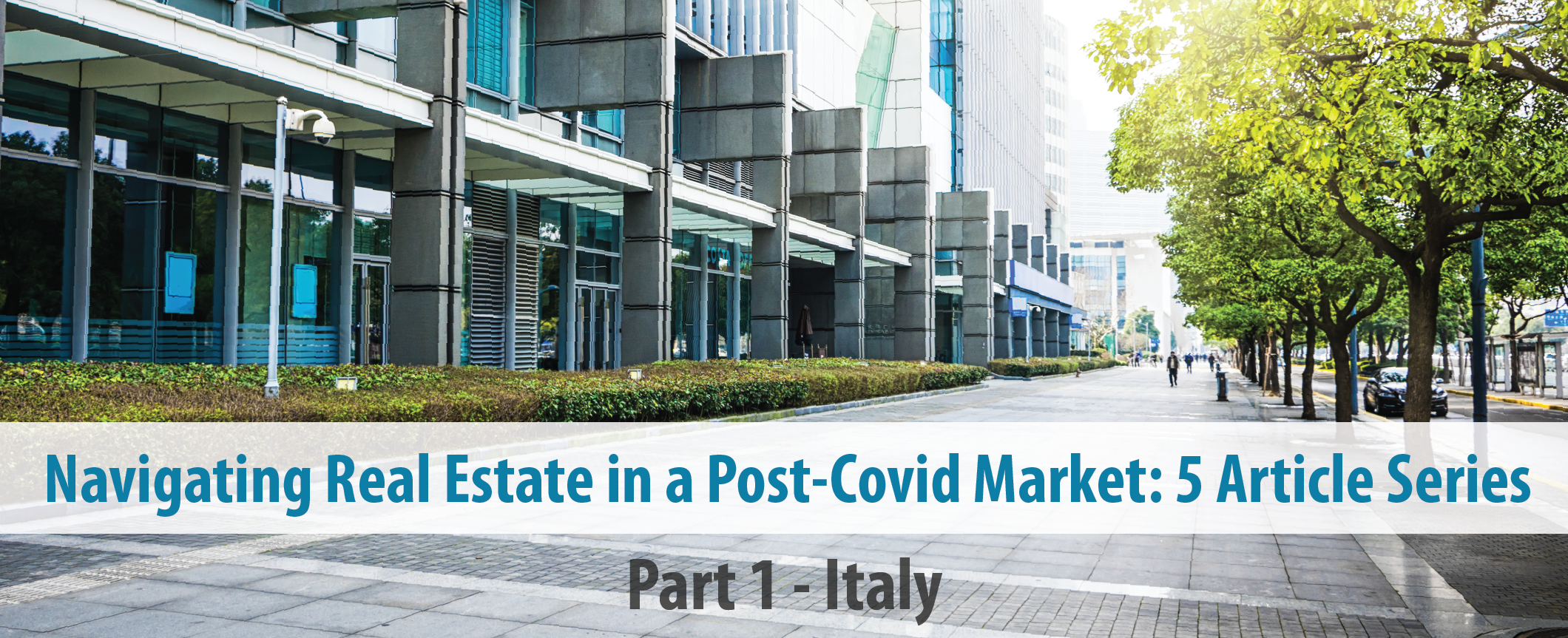The Covid-19 pandemic has raised a world-wide health emergency. The pandemic affected and continues to affect not only everyone’s day-to-day activities but also different sectors of economy, including commercial real estate market. Join us for this 5-part blog series as real estate experts from Finland, Italy, France, Cyprus and the United States tackle the subject of “Navigating Real Estate in a Post-Covid Market”.
In Part 4, two lawyers from Aliant France, Fanny Hurreau and Jonathan Pierre-Louis discuss two topics; how Covid-19 has had impacted the relationships between lessors and lessees, more precisely if there is any solutiuon found in France to preserve the interests of both parties and what is the assesment of commercial real estate in France following Covid-19.
What has been the impact of the health crisis on the relationship between lessors and lessees? Has a solution been found to preserve the interests of both parties?
In France, as in other countries, the Government has taken different measures to avoid an economic disaster. Due to the lockdown, everybody knows that shop owners have been deprived of a large part of their turnover.
Which Government measures are we talking about?
– financial support
– possibility to suspend rent payments
– protection of lessees during the “legally protected period” which prevents lessors of the right to take action for recovery of “Covid” rents in case of late payment.
(These measures apply subject to certain conditions of turnover and number of employees.)
With these measures, the Government thought that they would be enough and that a balance has been found between the interests of the lessors and the lessees.
Indeed, the rents are still due but their payment is suspended during a specific period, above all, during this period the lessor is prevented from acting against lessee (March-September 2020 and October 2020-July 2021)
But things weren’t so easy because the crisis opened doors to new legal arguments from the lessees who tried to contest the payment of rents using novel arguments such as: the obligation to negotiate in good faith, the theory of unforeseeability (circumstances are unforeseeable, the contract has become too onerous, the parties are therefore under an obligation to renegotiate), or the theory of the exception of non-performance (the shop was closed, I didn’t make any sales, so I won’t pay).
So, there are two opposing positions:
– the position of the lessee who will not pay “Covid” rents, continues to operate the business and tries to gain time;
– the lessor who wants to be paid and, failing that, could terminate the lease contract.
This situation has created a lot of litigation, that we have managed on a daily basis for our clients.
While waiting for clear directions from the courts, the search for alternatives to litigation, as encouraged by judges, appears to be the most prudent solution.
As the result, we think that, in the interests of all the parties, the key to getting out of this situation is to negotiate.
In many cases, a balance can be found by lessor agreeing to waive part of his claim while lessee pays the balance according to a schedule. The lease continues but if lessee fails to honor his commitments, the contract may be terminated.
The assistance of a lawyer in such matters is useful, since it will ensure the confidentiality of the exchanges during the negotiations (so, if the discussions are not successful, the parties cannot talk about what was said). Most importantly, legal counsel will make it possible to avoid the many traps which the parties may be confronted with, since the public health crisis is above all an economic crisis and it’s essential to master many subjects (such as lease litigation, recovery procedures and insolvency procedures).
What is the assesment of commercial real estate following the Covid Crises?
For the retail market, prior to the Covid crisis, retailers and shopping center occupants had begun to change their business model.
In fact, retailers were focusing their development on improving communication channels and sales on the Internet.
And for shopping center property owners, they had begun to develop all kinds of leisure activities that can be offered in shopping malls.These developments were made in order to meet the new needs of customers who no longer come to malls only to shop.
Following the pandemic, the first things that we can observe is that the previous trends have accelerated due to the alternate periods of closure and opening and the implementation of sanitary protocols:
– the first trend was the innovation of the shopping mall spaces to attract clients.This innovation takes place with a lot of events of all kinds designed to attract and keep customers: cultural, culinary, technological… Mall owners and retailers want to bring higher value to the mall compared to the classic shopping experience.
– the second trend was the development of online retail.In fact, all our clients who did not have an online presence rushed to create websites to deal with the various administrative closures. Especially for a retailer, an internet website is a must. In this context, it may be advisable for on-line companies to work with a law firm in order to draft terms and conditions of sale and ensure compliance with the European general data protection regulation. With the new consumer habits, it is impossible for a retailer to not have a website.
Retailers have also benefited from the rise of click and collect.In fact, click and collect has been used for businesses that did not use it before, such as clothing or book shops.
The closure of many businesses and the massive development of remote work has also had a definite impact on retail real estate: according to our retailer clients, the impact of one day of remote work in a given geographical area result in a 20% decrease on their weekly sales!
For office real estate, remote work has also led companies to rethink their organization by practicing flex-office for example.
On one hand, the rise of remote work will never call into question the need for a company to have commercial premises for the employees. On the other hand, customers are returning to shopping, with a 15% increase between June 2020 and June 2021.
Retailers are planning again and taking the step of renting/acquiring commercial space. There is a strong rental demand and upward trend in France’s major cities, with for example inflation reaching 10% in Paris.
It should be also noted that this period of health crisis is characterized, in France, by an extremely low number of insolvency proceedings compared to previous years.
This can be explained by the fact that, for months, certain professionals, who were already in difficulty before the covid crisis, have been “on a state subsidy” due to the numerous measures put in place to support businesses. For example, revenues from click and collect were not taken into account to benefit from state support. Companies that were already in a bad situation before the crisis were able to benefit from the states supports in order to save their business.
In fact, there were 21 000 (twenty-one thousand) less insolvency filings between March 2020 and June 2021 compared to the previous year.
The question now arises of a rebound in business bankruptcies in the coming months…
In such a case, investment opportunities in France in the commercial real estate sector will grow through takeover procedures supervised by the bankruptcy court, which could be numerous. This is a good opportunity for investors to buy certain assets at a discount.
To conclude, commercial real estate players are now confident: real estate is by nature a long-term market and, above all, it’s a market with a significant rebound capacity, as illustrated by the current situation.
For more information onreal estate law in France contact Fanny Hurreau at fhurreau@aliantlaw.com and Jonathan Pierre-Louis at jpierrelouis@aliantlaw.com
Or watch watch the full webinar Navigating Real Estate in a Post-Covid Market: 5 Countries Perspectives here.




